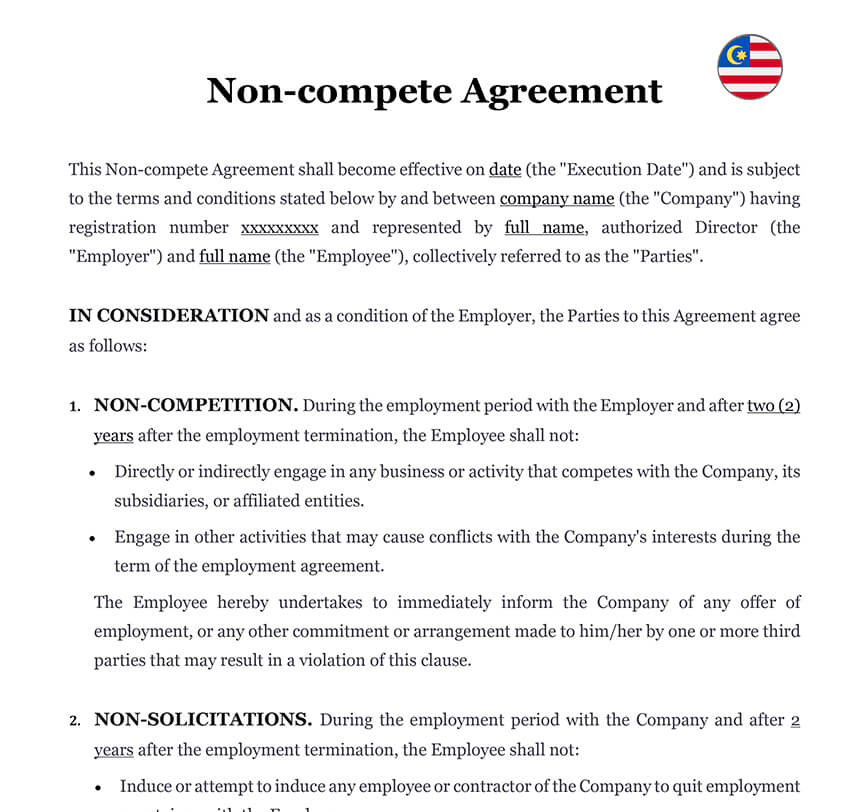Ready to use legal template
Drafted by experienced lawyers
Compliant with Malaysian law
Ready to use legal template
Drafted by lawyers
Compliant with Malaysian law
Learn more about Employee Non-compete Agreement in Malaysia
You can also use an employee non-compete agreement which is a legal document that prohibits an employee from working for a competitor or starting their own competing business for a certain period of time after leaving their current employer. Downloading and using our template will help protect your company’s confidential information, trade secrets, and customer relationships, and prevent former employees from using the knowledge and skills they gained while working for the company to benefit a competitor. Written by lawyers who follow the local jurisdiction, you can be sure that the agreement is legally compliant and follow the local laws and regulations.
Table of contents
-
What is an employee non-compete agreement and why is it important?
-
What are the key components of a typical employee non-compete agreement?
-
Are employee non-compete agreements legal?
-
How can employers ensure the enforceability of employee non-compete agreements?
-
What are the consequences for employees who violate it?
-
How does it impact an employee's ability to find new employment?
-
How does it compare to other types of restrictive covenants?
-
What are the best practices for drafting and implementing it?
What is an employee non-compete agreement and why is it important?
An employee non-compete agreement is put in place to protect an employer’s confidential information, trade secrets, and other proprietary information from being shared with competitors. Non-compete agreements are also used to protect an employer’s customer relationships, and to prevent former employees from using their knowledge of the company’s inner workings to gain an unfair advantage in the marketplace. Employers in Malaysia use non-compete agreements to protect their business interests and to prevent former employees from harming the business.
ℹ️ If you intend to terminate an Employment Contract, you may write an Employment Termination Letter and to prevent your employee from revealing information to the competition, you can have them sign a Confidentiality Agreement.
What are the key components of a typical employee non-compete agreement?
A typical employee non-compete agreement in Malaysia will typically include the following key components:
| ➤ A description of the specific activities that the employee is prohibited from engaging in after leaving the company. This could include working for a direct competitor, starting a competing business, or soliciting the company's customers or employees. |
| ➤ A time period during which the non-compete agreement will be in effect. This is typically the duration of the restriction, the non-compete agreement has to be reasonable and not impose undue hardship on the employee. |
| ➤ A geographical area where the non-compete agreement applies. This is the area where the employee is prohibited from working for a competitor or starting a competing business. |
| ➤ A statement of the employer's confidential information and trade secrets that the employee is prohibited from disclosing or using after leaving the company. |
| ➤ The remedies available to the employer in the event of a violation of the non-compete agreement, such as monetary damages or an injunction. |
| ➤ A provision for the agreement's binding effect on the employee and the employer. |
| ➤ A statement of the law governing the agreement and the jurisdiction where the disputes will be resolved. |




